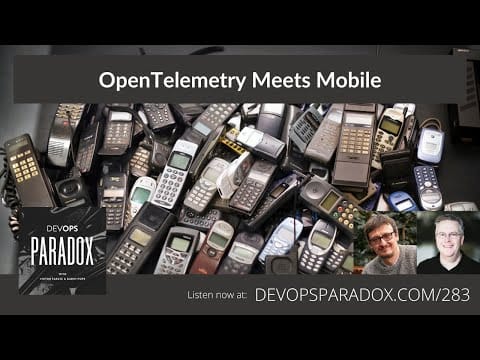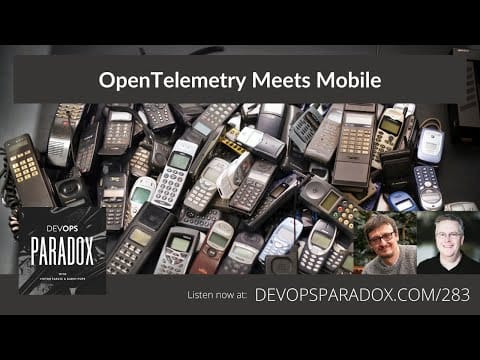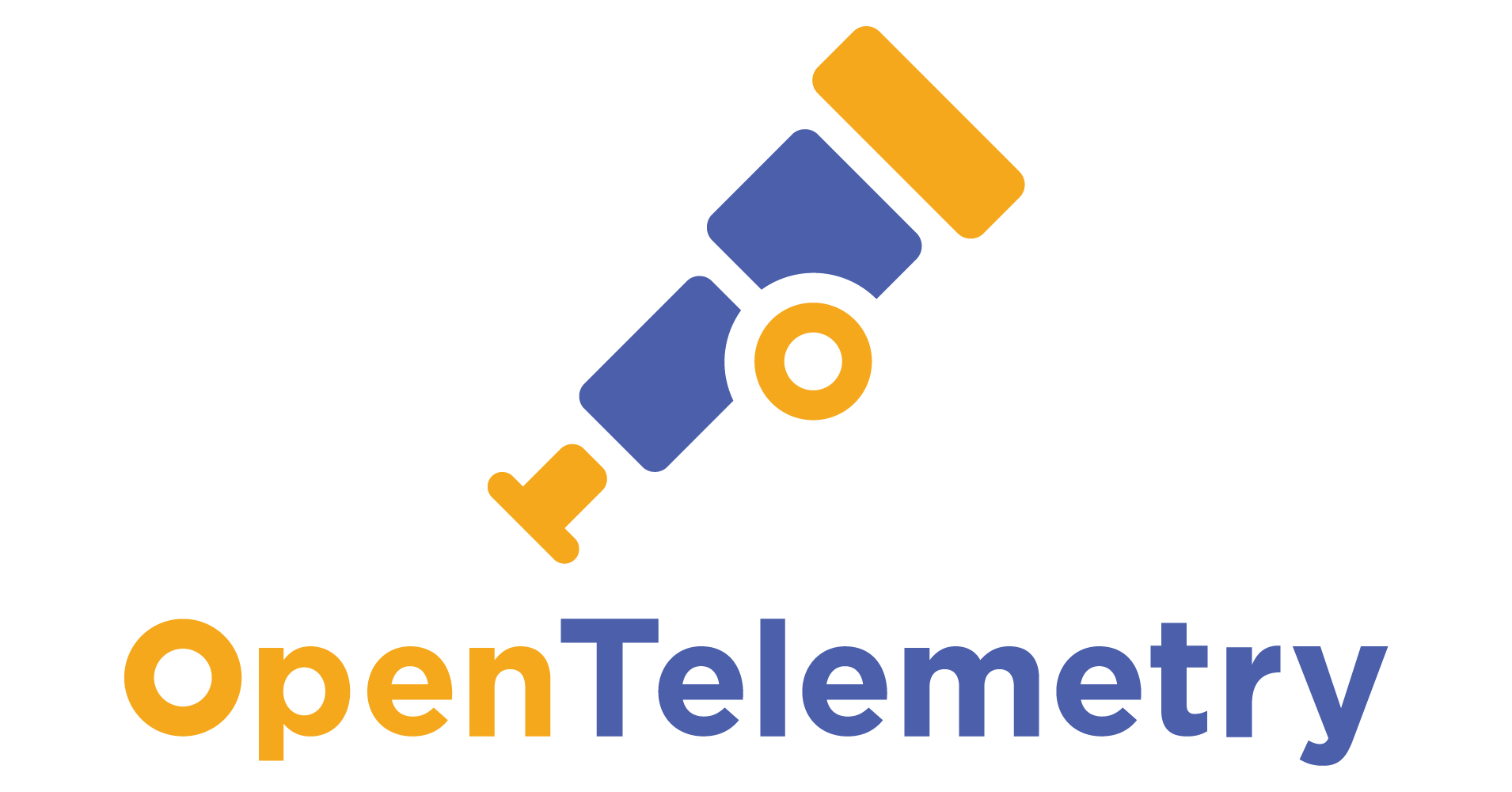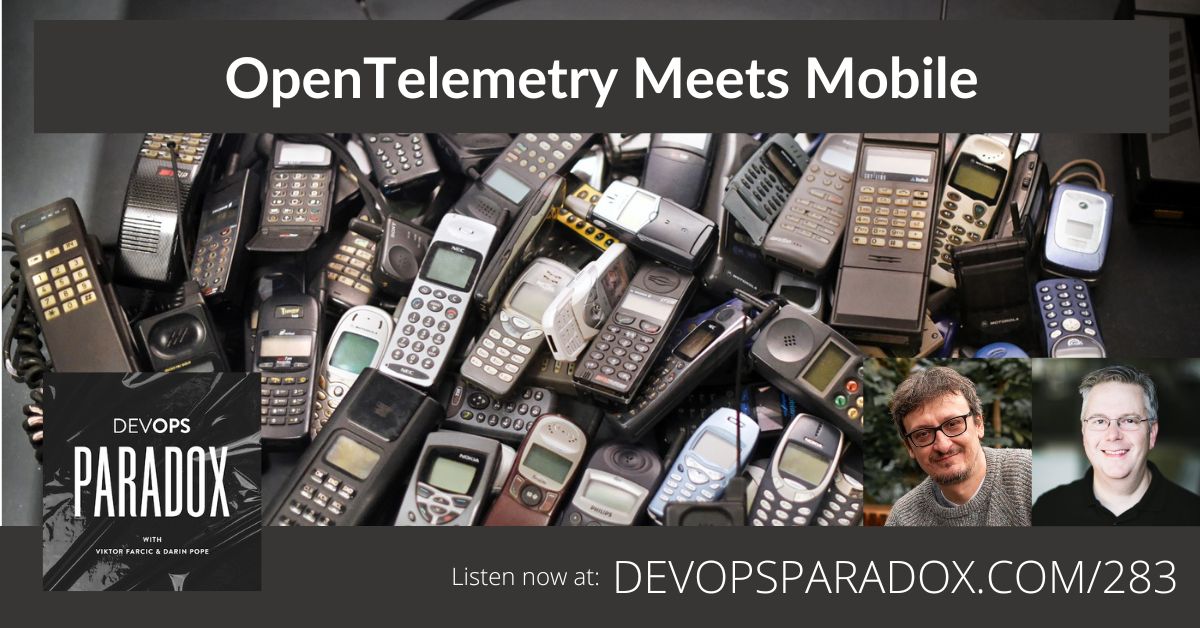DevOps Paradox: OpenTelemetry meets Mobile
 Nicolás Georger
Nicolás Georger

This episode of DevOps Paradox features Austin Alexander from Embrace (https://embrace.io/), a mobile app observability platform. The discussion delves into the fascinating world of OpenTelemetry for mobile development, exploring its challenges, benefits, and future potential.
OpenTelemetry: Beyond the Server
OpenTelemetry, the rising star of observability, has revolutionized how backend systems are monitored and understood. However, as Austin highlights, its reach extends beyond servers. OpenTelemetry offers a standardized approach to instrumenting mobile apps.
Embrace: Bridging the Gap
Embrace (https://embrace.io/) provides open-source SDKs that empower mobile developers to leverage OpenTelemetry. These SDKs, available for iOS, Android, React Native, Flutter, and Unity, simplify the process of instrumenting mobile apps and exporting telemetry data to various backends.
Challenges of Mobile Observability
Mobile app observability presents unique challenges compared to traditional server-side monitoring. Here's a look at some of these hurdles:
- Limited Control Over Hardware and Network Conditions: Mobile devices operate in unpredictable environments with varying network connectivity, battery life, and hardware capabilities.
- App Store Review Processes: Releasing updates for mobile apps involves a review process, which can delay the deployment of bug fixes and new features.
- Diverse Device Ecosystem: The mobile landscape comprises a wide array of devices with different screen sizes, operating system versions, and hardware specifications.
Benefits of OpenTelemetry for Mobile
Despite the challenges, OpenTelemetry brings significant advantages to mobile development:
- Standardized Instrumentation: OpenTelemetry provides a consistent and vendor-agnostic approach to instrumenting mobile apps, reducing reliance on proprietary SDKs.
- Flexibility in Data Export: Developers can choose from various OpenTelemetry-compatible backends, such as Grafana, DataDog, and Prometheus, to store and analyze telemetry data.
- Improved Debugging and Performance Monitoring: OpenTelemetry enables developers to gain deeper insights into app behavior, identify bottlenecks, and resolve issues more effectively.
Metrics: A Work in Progress
While Embrace currently supports logs and traces, metrics collection is still under development. The interview explains that attributing metrics to specific user actions and device capabilities in a meaningful way requires careful consideration.
Importance of Community Involvement
The interview emphasizes the significance of active participation in the OpenTelemetry community, particularly the client-side and Swift SIGs. By collaborating with other developers and contributing to the project, Embrace ensures its SDKs remain aligned with the evolving OpenTelemetry standards.
Get Involved
- Embrace SDKs: https://github.com/embrace-io
[
Embrace
Embrace has 70 repositories available. Follow their code on GitHub.

](https://github.com/embrace-io?ref=sredevops.org)
- OpenTelemetry Community: https://opentelemetry.io/community/
[
Community
OpenTelemetry is an open source project that anyone in the community can use, improve, and enjoy. We’d love you to join us! Learn and Connect Using or want to use OpenTelemetry? Find out more here: Mailing Lists: List of mailing lists that the project uses. Mastodon: Follow us on Mastodon to get the latest news! X: Follow us on X, previously known as Twitter, to get the latest news! Stack Overflow: Practical questions and curated answers OTel logos: Official OpenTelemetry logos Meeting Recordings: Watch our meeting recordings on Zoom Cloud Site analytics: Google analytics for opentelemetry.
 OpenTelemetryCC BY 4.0
OpenTelemetryCC BY 4.0

](https://opentelemetry.io/community/?ref=sredevops.org)
- DevOps Paradox: https://www.devopsparadox.com/
[
DevOps Paradox
DevOps Paradox
 DevOps ParadoxDarin Pope and Viktor Farcic
DevOps ParadoxDarin Pope and Viktor Farcic

](https://www.devopsparadox.com/?ref=sredevops.org)
Subscribe to my newsletter
Read articles from Nicolás Georger directly inside your inbox. Subscribe to the newsletter, and don't miss out.
Written by

Nicolás Georger
Nicolás Georger
Cybernetics, Linux and Kubernetes enthusiast. Site Reliability Engineering/DevOps culture, self educated IT professional, social sciences academic background.
